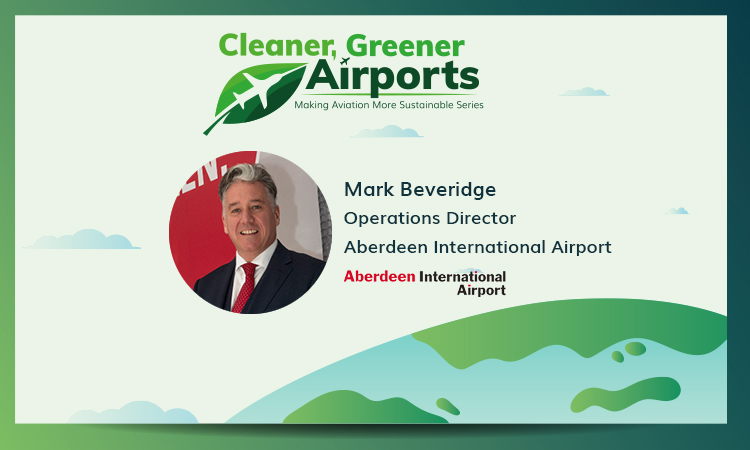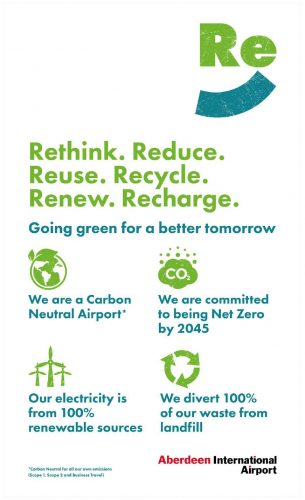Cleaner, Greener Airports: Making Aviation More Sustainable – Aberdeen Airport
- Like
- Digg
- Del
- Tumblr
- VKontakte
- Buffer
- Love This
- Odnoklassniki
- Meneame
- Blogger
- Amazon
- Yahoo Mail
- Gmail
- AOL
- Newsvine
- HackerNews
- Evernote
- MySpace
- Mail.ru
- Viadeo
- Line
- Comments
- Yummly
- SMS
- Viber
- Telegram
- Subscribe
- Skype
- Facebook Messenger
- Kakao
- LiveJournal
- Yammer
- Edgar
- Fintel
- Mix
- Instapaper
- Copy Link
Posted: 25 June 2021 | Mark Beveridge | No comments yet
Mark Beveridge, Operations Director for Aberdeen International Airport, details how sustainability will be at the heart of the airport’s priorities as it recovers from COVID-19 in the latest instalment of International Airport Review’s exclusive series.


Like every part of society, Aberdeen International Airport (ABZ) came to an almost complete standstill in March 2020 due to the sudden and dramatic impact of coronavirus. We remained open throughout the pandemic to support critical lifeline services to remote communities in the Highlands and Islands of Scotland and to ensure that the country’s oil & gas industry was able to operate.
As we rebuild, Aberdeen International Airport is committed to balancing the undoubted economic and social benefits of aviation with our climate change responsibilities”
Only now, some 15 months later, are we slowly seeing the return of a limited number of flights, but we are under no illusion that our recovery will take many years.
Airports are the engines of the economy. They create jobs, they facilitate imports and exports and they support our tourism industries. They will have a vital role to play in supporting our recovery by rebuilding the connectivity that will get our countries and economies moving again. As we rebuild, Aberdeen International Airport is committed to balancing the undoubted economic and social benefits of aviation with our climate change responsibilities.
Sustainable aviation
Prior to the pandemic, many were questioning the merits of aviation as a sustainable form of transport. Flygskam, or ‘flight shame’, was gathering momentum and was credited with the fall in passenger numbers at Sweden’s airports in 2019.
Whilst the pandemic may have checked our progress, it has not altered the course that our sector had set, and Aberdeen International Airport is committed to playing its part”
All levels of government were enacting policies and legislation in response to the climate emergency. In February 2020, the UK aviation industry also responded when it committed to net zero carbon emissions by 2050, which, at the time, was the first national net zero aviation commitment anywhere in the world. Sustainable Aviation’s decarbonisation roadmap laid out the plan to achieve this and included key measures such as investment in sustainable aviation fuels (SAF), cleaner aircraft and engine technology and an airspace modernisation programme.
Whilst the pandemic may have checked our progress, it has not altered the course that our sector had set, and Aberdeen International Airport is committed to playing its part. I’m pleased to say that we have already made significant progress in addressing our environmental impacts.
In 2020, we achieved carbon neutrality status for the emissions under our direct control (Scopes 1 and 2), and we aim to achieve net zero carbon for direct emissions by the mid-2030s.
This is an important first step, however, we recognise that the airport has a wider impact over and above direct emissions. That is why we are committed to achieving net zero carbon emissions (Scopes 1 to 3) by 2045.
Sector recognition
Our efforts in working towards a more sustainable future were recognised in 2020 by the leading global sustainability organisation, Global Real Estate Sustainability Benchmark (GRESB). GRESB provides standardised and validated Environmental, Social and Governance (ESG) data to the capital markets. Each year, GRESB assesses and benchmarks the ESG performance of real assets worldwide.
Together with our sister airport, Glasgow Airport (GLA), Aberdeen received a five-star rating for our sustainability performance”
Together with our sister airport, Glasgow Airport (GLA), Aberdeen received a five-star rating for our sustainability performance, and both were recognised as “airport transport sector leads.” Aberdeen was ranked second within both the UK and European Transport: Airport Companies categories, as well as in the same worldwide category.
To be recognised in the GRESB benchmarking annual assessment was not only a tremendous achievement, but it confirmed that our efforts in sustainability are well placed.
We have always been acutely aware that operating such important pieces of infrastructure comes with responsibilities; to our people, to our communities and to the environment.
Our sustainability strategy is anchored in the United Nations’ (UN) Sustainable Development Goals (SDG) which are defined as: “A blueprint to achieve a better and more sustainable future for all. They are a universal call to action to end poverty, protect the planet and ensure that all people enjoy peace and prosper.”
Using the SDGs, we have identified key priorities which have been grouped into the three pillars of environmental, social and economic impacts, referred to as the “triple bottom line” by the Global Reporting Initiative (GRI), the international institution that sets global sustainability reporting.
Green initiatives


Credit: Aberdeen International Airport
We have embarked on a number of initiatives at Aberdeen that are aimed at reducing our environmental impact and supporting the communities that we serve.
Our electricity is purchased from 100 per cent renewable sources and we divert 100 per cent of our waste from landfill. We are also working towards eliminating single-use plastic from our terminal. This has involved the installation of water refill stations to allow passengers to fill up their own water bottles. We also installed a counter which lets people know how many plastic bottles have been refilled using the station.
Aberdeen is part of AGS Airports, which was the first UK airport group to trial a new Oxo-Biodegradable 100ml security bag. The new sustainable bags are available free of charge to passengers in our security area and will remove more than two million single-use plastic bags each year from across the group.
The technology involved ensures that the bag will begin to degrade over a selected period of time – between 17 and 24 months of a bag’s lifespan – down to a natural bio-mass, rather than the more damaging micro-plastics associated with single-use alternatives.
Reducing waste
We are also focused on reducing food waste at the airport. Since August 2020, we have been donating excess food items that are still consumable to a local homeless charity, Aberdeen Cyrenians, which supports thousands of the most vulnerable people in society.
Since August 2020, we have been donating excess food items that are still consumable to a local homeless charity, Aberdeen Cyrenians”
Throughout the pandemic, Aberdeen Cyrenians has seen demand for its services increase by 600 per cent, which is why the airport took the decision to step in. The donations have become food parcels, with more than 1,200 people benefitting to date.
The coronavirus pandemic and the subsequent collapse in passenger demand has impacted our retail offering at Aberdeen and resulted in the closure of one our landside cafes, which had been operated by The Restaurant Group (TRG). This was a big blow for the staff who had worked there and for our passengers, however, by working closely with TRG, we were able to ensure that some good came from it. Together with TRG, we were able to support several businesses, community groups and charities with a donation of high-end café equipment following the closure.
The team worked hard to ensure that the equipment, which was worth thousands of pounds, went to a good home in the north-east of Scotland, with more than 30 groups receiving various pieces of professional catering equipment, including fridge displays, a professional barista coffee machine, two commercial filter coffee machines and many more items.


Credit: Aberdeen International Airport
Aiding our communities
It is important that the communities that we serve benefit from the airport. As part of AGS, we are leading a consortium that includes the NHS West of Scotland Innovation Hub, the University of Strathclyde and leading air traffic control (ATC) provider NATS to develop and trial what will be the UK’s first national distribution network to use drones to transport essential medicines, blood, organs and other medical supplies throughout Scotland.
The CAELUS (Care & Equity – Logistics UAS Scotland) project, which brings together 13 organisations, successfully secured £1.5 million from the UK Industrial Strategy Future Flight Challenge Fund to demonstrate how autonomous drone technology can enhance access to essential medical supplies and can help to provide equity of care between urban and remote rural communities in Scotland.
In addition to developing the ground infrastructure needed to recharge the drones and the systems to control them while flying, a key aspect of the project will be designing pathways to ensure that the drones can safely share airspace with civil aviation. The project will also ensure that critical aspects such as public safety, security and noise levels are considered.
This project has the potential to completely revolutionise the way in which healthcare services are delivered in Scotland. The organisations within this consortium are some of the most skilled and experienced in drone technology.
Although our focus is on healthcare, the CAELUS project could pave the way for the deployment of drone-enabled logistics in other sectors and has the potential to change the way that airspace is used by manned and unmanned vehicles. It also has clear environmental benefits, as it will play a key role in reducing the carbon emissions generated by existing, road-based distribution networks within Scotland.
Aberdeen International Airport and AGS Airports are committed to working with governments to ensure that we play our role in addressing the climate emergency”
In November, the eyes of the world will fall on the UK when Glasgow hosts the United Nations Climate Change Conference (COP26). It will be the most significant COP since 2015, when, on 15 December 2015, world leaders signed the Paris Agreement.
Aberdeen International Airport and AGS Airports are committed to working with governments to ensure that we play our role in addressing the climate emergency. We want to help to secure a low carbon future that is socially inclusive, respectful of human rights and connected.
Mark Beveridge joined Aberdeen International Airport as Operations Director in 2020. He has held a number of senior positions in the energy sector, including Regional Director and Regional Operations Director with TWMA and Sparrows.
Beveridge has extensive senior operational experience in a safety-focused environment and, having worked and led large teams in the energy sector, he brings years of operational and commercial experience to Aberdeen International Airport.
Related topics
Airport crisis management, Airside operations, Cleaner, Greener Airports: Making Aviation More Sustainable Series, COVID-19, Drones, Emissions, Passenger volumes, Sustainability, Sustainable Aviation Fuel (SAF), Sustainable development, Terminal operations


















